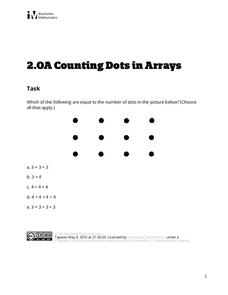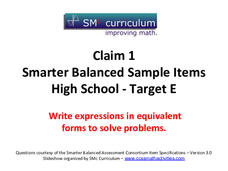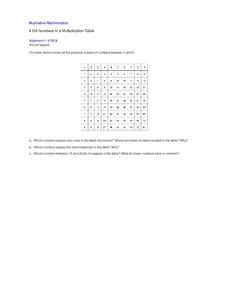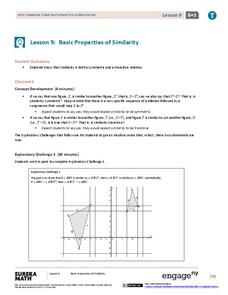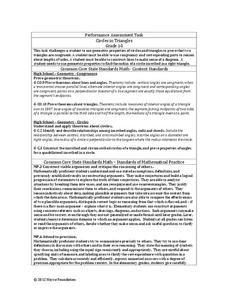Curated OER
Patterns in the Multiplication Table
Explore patterns in the multiplication table in order to deepen your third graders' understanding of this essential skill. Implement this activity as a whole-class lesson, allowing students to work in pairs or small groups to support...
Illustrative Mathematics
Counting Dots in Arrays
Mathematical arrays can represent several different math skills, including counting groups, multiplication, and even area. In this specific task, learners are asked to identify the addition equations that are equal to a 3 x 4 array....
CCSS Math Activities
Smarter Balanced Sample Items: High School Math – Target E
Pupils rewrite expressions in equivalent forms to identify key features. They use the vertex and factored forms of quadratic expressions to identify the extrema and intercepts. To finish the installment of the Claim 1 Item Slide Show...
CCSS Math Activities
Smarter Balanced Sample Items: 8th Grade Math – Target B
Develop a radical approach to covering the Smarter Balanced targets for 8th grade math with a presentation that helps further develop math skills. Seven sample items demonstrate the expectation for working with integer exponents,...
EngageNY
The Distributive Property and the Products of Decimals
Make multiplication of decimals easier by applying the distributive property. Pupils investigate how they can use the distributive property to multiply decimals. After learning the strategy, they work on some practice problems at...
EngageNY
Linear and Nonlinear Expressions in x
Linear or not linear — that is the question. The lesson plan has class members translate descriptions into algebraic expressions. They take the written expressions and determine whether they are linear or nonlinear based upon the...
Virginia Department of Education
Angles, Arcs, and Segments in Circles
Investigate relationships between angles, arcs, and segments in circles. Pupils use geometry software to discover the relationships between angles, arcs, and segments associated with circles. Class members use similar triangles to...
EngageNY
Solving a Linear Equation
Solving an equation is the art of creating simpler equivalent equations using properties of equality. Here, classes see that solving an equation is not always as easy as guessing. The lesson presents linear equations that scholars must...
EngageNY
Properties of Area
What properties does area possess? Solidify the area properties that pupils learned in previous years. Groups investigate the five properties using four problems, which then provide the basis for a class discussion.
Illustrative Mathematics
Numbers in a Multiplication Table
Identifying patterns is a crucial skill for all mathematicians, young and old. Explore the multiplication table with your class, using patterns and symmetry to teach about square numbers, prime numbers, and the commutative and identity...
CCSS Math Activities
Smarter Balanced Sample Items: 8th Grade Math – Claim 3
Communication is the key. A dozen sample items require scholars to communicate their reasoning involved in arriving at a solution. The PowerPoint from the Gr. 8 Claim 2 - 4 Item Slide Shows series uses a variety of content to...
Balanced Assessment
Square in Square
Challenge the class to devise a method to determine the dimensions of a rectangle inscribed in another rectangle. Pupils make connections between functions and geometry as they examine the area and perimeter of a square or...
EngageNY
Solutions of a Linear Equation
Use the distributive property to solve equations. The sixth lesson plan in a 33-part series has scholars solve equations that need to be transformed into simpler equations first. Class members apply the distributive property to the...
EngageNY
Definition and Properties of Volume
Lead a discussion on the similarities between the properties of area and the properties of volume. Using upper and lower approximations, pupils arrive at the formula for the volume of a general cylinder.
Illustrative Mathematics
What is a Trapezoid? (Part 2)
This collaborative activity investigates the meaning of a trapezoid and a parallelogram. It begins by presenting two different definitions of a trapezoid. Learners are to reason abstractly the difference between the two definitions and...
Balanced Assessment
Bumpy-Ness
Develop a new measure of the properties of an object. Scholars develop a definition and formula to measure the bumpy-ness of an object. They utilize their formulas to find the property for several spherical objects.
Illustrative Mathematics
The Sign of Solutions
Positive or negative, zero or no solution, are all possibilities for the solution of a linear equation. Here the resource gives examples of linear equations in one variable and their type of solutions. The resource comes with commentary...
Fuse School
QUIZ: Properties of Water and Dilution
What's the solution to gaining insight into your class' progress? Give this brief quiz a try! Part 10 of a 14-installment series on states of matter tests learners' skills in the areas of dilution and the properties of water,...
Curated OER
Symmetry of the Addition Table
Help your class discover the commutative property of addition with this exploration of the addition table. By folding and coloring the table, a symmetry is found that directs students to an understanding of this crucial mathematical...
EngageNY
Basic Properties of Similarity
Does the symmetry and transitive property apply to similarity? The 10th segment in a series of 16 presents the class with a group of explorations. The explorations have pairs show that similarity is both symmetrical and transitive....
EngageNY
Informal Proofs of Properties of Dilations
Challenge the class to prove that the dilation properties always hold. The lesson develops an informal proof of the properties of dilations through a discussion. Two of the proofs are verified with each class member performing the...
EngageNY
Properties of Dilations
Investigate dilations to learn more about them. The second segment in a series of 16 provides a discussion of properties of dilations by going through examples. The problem set provides opportunities for scholars to construct dilations.
Inside Mathematics
Circles in Triangles
Challenge the class with inscribed circles in triangles. The assessment task requests class members use their knowledge of circles and right triangles to prove two triangles are congruent. They go on to utilize their knowledge of...
Mathed Up!
Algebra: Indices
Indices and exponents mean the same. Pupils review exponential notation by watching the review video for the General Certificate of Secondary Education math assessment refresher. Scholars then use the activity to show what they know...

